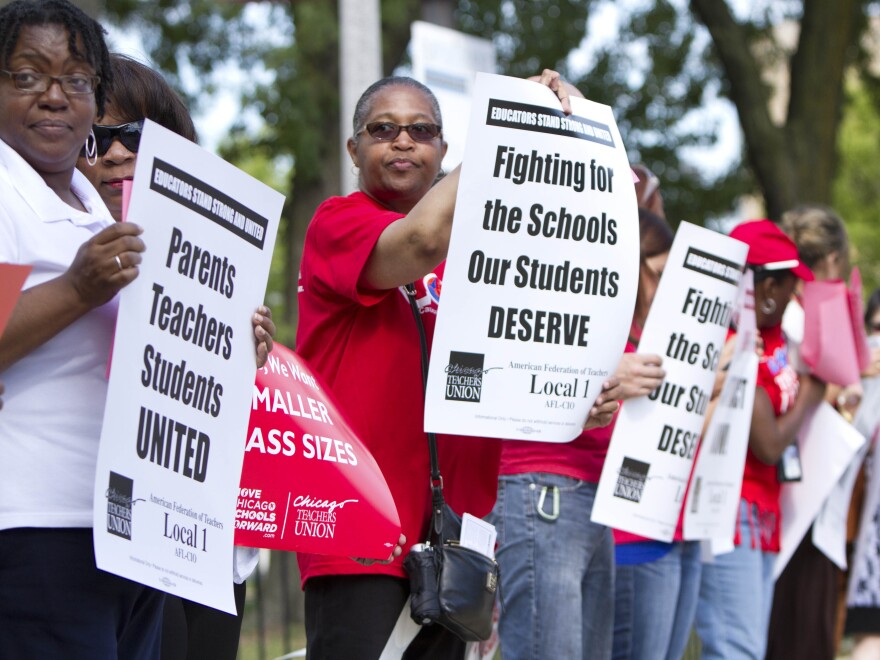The Chicago Public Schools system is teetering on the edge of a strike, just a week into the school year. Teachers say they'll walk out Monday morning if tense weekend negotiations don't bring a contract. It would be the first Chicago teachers strike in 25 years.
At Parker Elementary School on Chicago's South Side, students are jumping double Dutch and hula-hooping. This is the first time many of the kids on this playground have ever had recess. The playtime is part of an extended school day pushed for by Mayor Rahm Emanuel.
In a deal worked out between the Chicago Teachers Union and the school district, elementary kids are in school for about an hour and 15 minutes longer every day. But, after 10 months of talks, teachers and school officials say they're still far apart on some other significant issues.
With similar budget woes and changes to the education system in districts across the country, the outcome of the Chicago dispute will be closely watched.
Points Of Contention
Chicago's contract battle pits a powerful mayor intent on shaking up the schools against a labor leader who says Emanuel's reforms are meant to cripple the union and will hurt public education.
In downtown Chicago on Labor Day, with thousands of teachers chanting along, Chicago Teachers Union President Karen Lewis called Emanuel a "bully."
"The only way to beat a bully is to stand up to a bully," she said.
The mayor has pursued a longer school day, a longer school year and a new system for evaluating teachers. The district has ignored union demands for greater job protection as it closes down low-performing schools and opens nonunion charters.
Teacher Mary Knuerr considers the mayor's reforms out of touch with what schools need to improve.
"I think that we're looking out for the kids," she says. "We're trying to get lower class sizes, quality education throughout the school day, spending time with the arts."
If teachers do walk out, the district plans to keep 144 "safety net" schools open for half-days to serve students breakfast and lunch. They'll be staffed by employees not in the teachers union.
But schools spokeswoman Becky Carroll says the district is urging teachers to continue negotiating.
"There's no reason we can't find the common ground needed to avoid a strike," she says.
Earlier this week, the union scoffed at an offer of 2 percent raises in each of the next four years. The school district says it's broke and that it faces a $665 million budget hole.
An Example To Avoid Or Follow?
Marty West, a professor at Harvard's Graduate School of Education, says teacher strikes are high-stakes affairs. That's one reason we haven't seen many. He says all eyes are on Chicago.
"Many districts are in a situation not too different from Chicago's, and how this plays out will be important in determining what goes on nationally," he says.
West says that a combination of tight education budgets, similar reform efforts and union opposition could be just the recipe for more threatened teacher strikes nationwide.
Many teachers, like Knuerr, note that a teacher strike in President Obama's hometown would be problematic, especially as Democrats court union votes. She hopes the president is telling that to Emanuel, his former chief of staff.
"Hopefully Barack Obama is getting in his ear and telling him, 'Let's meet them halfway,' " she says.
Both sides are expected to remain at the bargaining table this weekend.
Copyright 2021 WBEZ. To see more, visit WBEZ. 9(MDIxMDkyNjUxMDE0NDY1Njg1NzRiOTRiYQ000))




